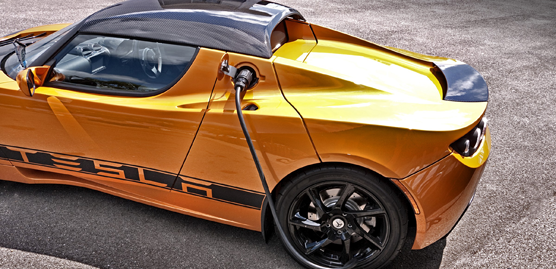Electric car charging: leave it to your agent

By 2020, electric cars will be commonplace, predict researchers at the Erasmus Centre for Future Energy Business led by Professor Wolf Ketter. Software agents play an important role in reaping the financial benefits from their battery capacity and in charging huge numbers of new electric cars without causing power failures.
Text Maaike Siegerist
Whereas PhD candidate Micha Kahlen sees new business opportunities for the owners of fleets of electric cars, his colleague Konstantina Valogianni pre-emptively counters the challenge that the unbridled charging of those cars poses to the grid. Both assign an important role to software agents that buy and sell energy on behalf of electric car owners. They will present their cutting-edge research at the upcoming Erasmus Energy Forum on 19 and 20 June 2014.
Electric cars as virtual power plants
 Electric cars may well become the buffer of tomorrow’s power grid, argue Micha Kahlen and his co-authors Prof. Ketter and Dr Jan van Dalen. As wind turbines, solar panels and other sustainable forms of energy production are on the rise, energy sources are bound to become more erratic. In this scenario, electric cars can be deployed to balance the grid. “You can use the batteries of electric cars to store energy when there is an excess supply of wind or solar energy, and use that energy later, when there’s no wind or sun,” Kahlen explains. “Electric cars don’t produce a lot each, but the collective mass of electric cars can be combined into virtual power plants.”
Electric cars may well become the buffer of tomorrow’s power grid, argue Micha Kahlen and his co-authors Prof. Ketter and Dr Jan van Dalen. As wind turbines, solar panels and other sustainable forms of energy production are on the rise, energy sources are bound to become more erratic. In this scenario, electric cars can be deployed to balance the grid. “You can use the batteries of electric cars to store energy when there is an excess supply of wind or solar energy, and use that energy later, when there’s no wind or sun,” Kahlen explains. “Electric cars don’t produce a lot each, but the collective mass of electric cars can be combined into virtual power plants.”
Selling energy back into the grid could become a lucrative enterprise for fleet owners: “For example, we are looking at the car-sharing company Car2Go, which rents out electric vehicles for a short amount of time. There’s a trade-off between renting out an electric vehicle and turning it into a virtual power plant. The fleet owner can choose the most profitable option.”
Virtual power plants would also have environmental and societal benefits. Based upon the researchers’ calculations, they would reduce CO2 emissions by 2.4 per cent and the average electricity price by 3.2 per cent. Kahlen explains: “At around six o’clock, when everyone comes home and turns on their electrical devices, you need additional electric capacity that’s idle the rest of the time. This electricity is generated by turning on carbon-intensive plants, which are both polluting and expensive. You can replace this energy with clean, stored energy, thereby reducing overall CO2 emissions and lowering the average electricity bill for all consumers.”

Software agents play a crucial role in this scheme. They will trade on the wholesale energy market on behalf of fleet owners. Kahlen: “As a human, you could not control a fleet of 500 cars or more. You need intelligent agents that act on information from energy markets – they know when it’s profitable to charge a car and when to turn it into a power plant – while also taking the preferences of customers – who want to be mobile – into account,.” The agents have been tested extensively in the simulated trading environment Power TAC. An important fact for fleet owners: it is important to be a ‘first mover’. With each additional electric car on the market, the profit-per-car decreases due to price-based competition.
New charging stations already enable cars to feed energy back into the grid. However, battery technology remains a bottleneck: using car batteries remains costly. But Kahlen is confident: “Studies show that new developments will soon reduce the costs, as battery technology is also being developed for mobile phones and laptops. Virtual power plants based on car fleets could be a reality by 2020.”
Personalised, smart charging
 While Kahlen and his team look at new business opportunities, Konstantina Valogianni and her co-authors Prof. Ketter, Dr John Collins of the University of Minnesota, and Dr Dmitry Zhdanov of the University of Connecticut anticipate that charging electric cars without a co-ordinating mechanism will put a huge strain on the electric grid, creating a very real danger of causing power outages. Valogianni: “Customers want their cars to charge fast. They charge them at a maximum of 25 kW within an hour, while an average household usually consumes 3 kW up to 10 or 11 kW. At some point, there is no supply to cover this demand. That’s the main problem. Prices will skyrocket and blackouts could occur.”
While Kahlen and his team look at new business opportunities, Konstantina Valogianni and her co-authors Prof. Ketter, Dr John Collins of the University of Minnesota, and Dr Dmitry Zhdanov of the University of Connecticut anticipate that charging electric cars without a co-ordinating mechanism will put a huge strain on the electric grid, creating a very real danger of causing power outages. Valogianni: “Customers want their cars to charge fast. They charge them at a maximum of 25 kW within an hour, while an average household usually consumes 3 kW up to 10 or 11 kW. At some point, there is no supply to cover this demand. That’s the main problem. Prices will skyrocket and blackouts could occur.”
So far, academic literature has only offered solutions that involve a central party co-ordinating the charging of electric cars. But Valogianni and her team take a decentralised approach. They propose an algorithm – Adaptive Management of EV Storage (AMEVS) – by which a software agent makes the decision whether to charge a car or to sell energy back to the retail market. The agent learns and tailors itself to individual car owners. Valogianni: “It focuses on the heterogeneity of the customers, who have different preferences and mobility habits. The algorithm learns our individual preferences and uses them to optimise charging times. It will allocate charging times differently within the time horizon of the day. That’s what makes the algorithm reduce peaks, and ultimately the demand on the grid becomes less volatile.”
The algorithm is run inside the car. “Ideally, you can schedule your driving routes and input your preferences into a chip in the car, for example, through a screen interface,” Valogianni says. This scenario is close to becoming a reality – Tesla Motors has already implemented a very simple version of personalised charging, where you can tell your car to charge during the night to benefit from lower tariffs. It paves the way for electric car management by algorithms such as AMEVS. “But of course, we need to test the algorithm in test beds like Power TAC before we can release it to the market.”
Erasmus Energy Forum
If you are interested in hearing more about Kahlen’s and Valogianni’s work on software agents and electric cars, you can meet the researchers at the upcoming Erasmus Energy Forum on 19 and 20 June 2014 in Rotterdam. The themes of this year’s event, which is divided into a Business Day and a Science Day, is micro grids and new business models, sustainable energy financing, as well as EU policy and markets.
From academics to energy companies and grid owners, from electric vehicle fleet owners to investors and banks, the Erasmus Energy Forum is a platform for those who want to learn more about this exciting new field and who are interested in meeting potential business partners.
- Visit the website of the Erasmus Energy Forum

<link people micha-kahlen>Micha Kahlen, MSc, is a first-year PhD candidate. He will present his paper, ‘Balancing Electricity Markets with Electric Vehicles,’ co-written by <link people wolfgang-ketter>Professor Wolfgang Ketter and <link people jan-van-dalen>Dr Jan van Dalen, at the Twenty Second European Conference on Information Systems in Tel Aviv.
<link people konstantina-valogianni>Konstantina Valogianni, MSc, is a third-year PhD candidate. She will present her paper, ‘Effective management of electric vehicle storage using smart charging’, co-written by <link people wolfgang-ketter>Professor Wolfgang Ketter, Dr John Collins of the University of Minnesota, and Dmitry Zhdanov of the University of Connecticut, at the Twenty-Eighth AAAI Conference (AAAI-14) in Québec.


